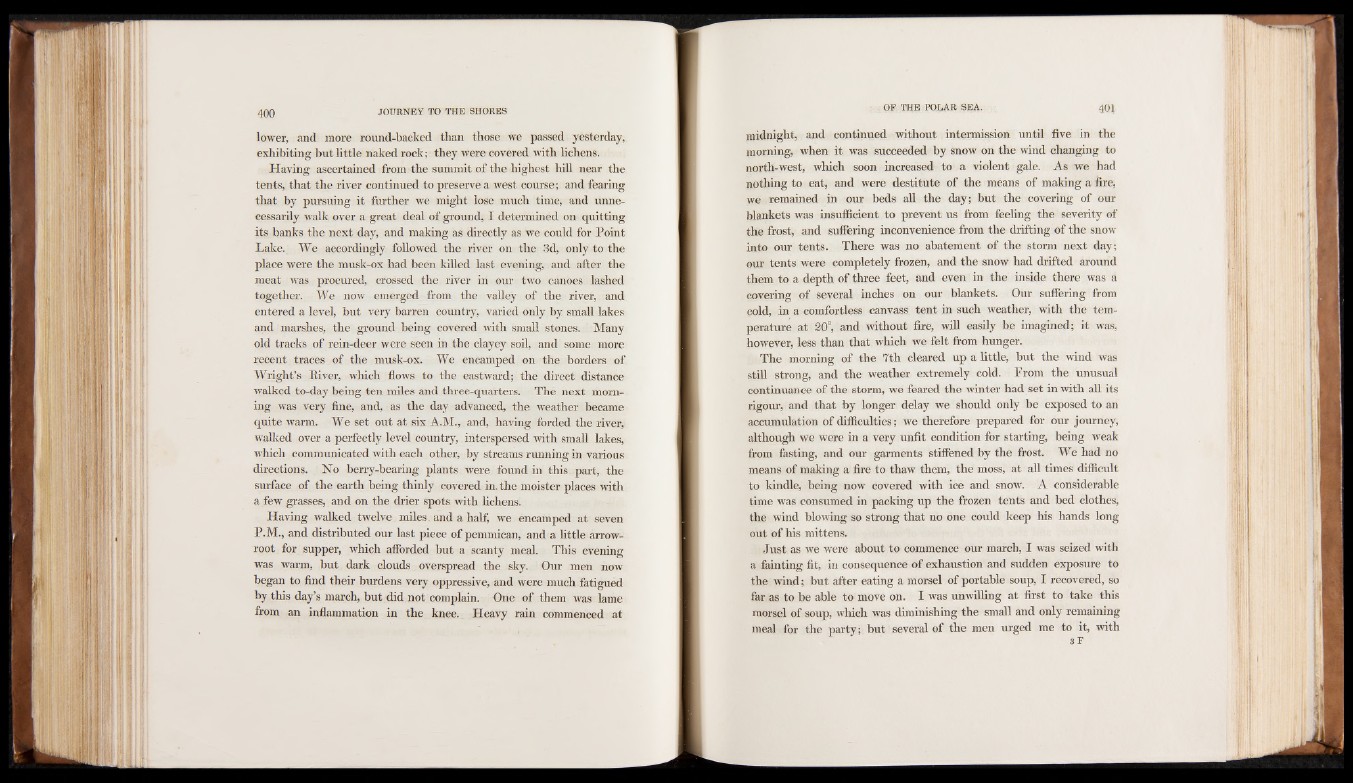
lower, and more round-backed than those we passed yesterday,
exhibiting but little naked rock; they were covered with lichens.
Having ascertained from the summit of the highest hill near the
tents, that the river continued to preserve a west course; and fearing
that by pursuing it further we might lose much time, and unnecessarily
walk over a great deal of ground, I determined on quitting
its banks the next day, and making as directly as we could for Point
Lake. We accordingly followed the river on the 3d, only to the
place were the musk-ox had been killed last evening, and after the
meat was procured, crossed the river in our two canoes lashed
together. We now emerged from the valley of the river, and
entered a level, but very barren country, varied only by small lakes
and marshes, the ground being covered with small stones.. Many
old tracks of rein-deer were seen in the clayey soil, and some more
recent traces of the musk-ox. We encamped on the borders of
Wright’s Kiver, which flows to the eastward; the_ direct distance
walked to-day being ten miles and three-quarters. The next morning
was very fine, and, as the day advanced, the weather became
quite warm. We set out at six A.M., and, having forded the river,
walked over a perfectly level country, interspersed with small lakes,
which communicated with each other, by streams running in various
directions. N o berry-bearing plants were found in this part, the
surface of the earth being thinly covered in. the moister places with
a few grasses, and on the drier spots with lichens.
Having walked twelve miles, and a half, we encamped at seven
P.M., and distributed our last piece of pemmican, and a little arrow-
root for supper, which afforded but a scanty meal. This evening
was warm, but dark clouds overspread the sky. Our men now
began to find their burdens very oppressive, and were much fatigued
by this day’s march, but did not complain. One of them was lame
from an inflammation in the knee. Heavy rain commenced at
midnight, and continued without intermission until five in the
morning, when it was succeeded by snow on the wind changing to
north-west, which soon increased to a violent gale. As we had
nothing to eat, and were destitute of the means of making a fire,
we remained in our beds all the day; but the covering of our
blankets was insufficient to prevent us from feeling the severity of
the frost, and suffering inconvenience from the drifting of the snow
into our tents. There was no abatement of the storm next day;
our tents were completely frozen, and the snow had drifted around
them to a depth of three feet, and even in the inside there was a
covering of several inches on our blankets. Our suffering from
cold, in a comfortless canvass tent in such weather, with the temperature
at 20°, and without fire, will easily be imagined; it was,
however, less than that which we felt from hunger.
The morning of the 7th cleared up a little, but the wind was
still strong, and the weather extremely cold. Prom the unusual
continuance of the storm, we feared the winter had set in with all its
rigour, and that by longer delay we should only be exposed to an
accumulation of difficulties ; we therefore prepared for our journey,
although we were in a very unfit condition for starting, being weak
from fasting, and our garments stiffened by the frost. We had no
means of making a fire to thaw them, the moss, at all times difficult
to kindle, being now covered with ice and snow. A considerable
time was consumed in packing up the frozen tents and bed clothes,
the wind blowing so strong that no one could keep his hands long
out of his mittens.
Just as we were about to commence our march, I was seized with
a fainting fit, in consequence of exhaustion and sudden exposure to
the wind; but after eating a morsel of portable soup, I recovered, so
far as to be able to move on. I was unwilling at first to take this
morsel of soup, which was diminishing the small and only remaining
meal for the party; but several of the men urged me to3 Fit, with